MercoPress. South Atlantic News Agency
Tag: Dilma Rousseff
-
Thursday, October 18th 2012 - 22:56 UTC
Venezuela/Paraguay rift spoils Brazil’s plans for a ‘normal’ Mercosur summit
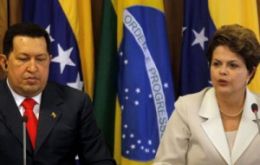
Venezuela’s expulsion of Paraguayan diplomats from Caracas, as a direct consequence of the ongoing conflict inside Mercosur has left Brazil with the challenge of recomposing relations inside the group ahead of Mercosur next summit in December which will be hosted by the administration of President Dilma Rousseff.
-
Tuesday, October 16th 2012 - 07:37 UTC
Brazil implements racial and income affirmative action at federal universities
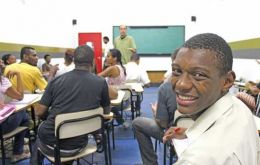
The law which forces Brazilian federal universities to leave 50% of higher education seats to students from government schools and minorities such as blacks and indigenous became effective on Monday.
-
Friday, October 12th 2012 - 00:18 UTC
Brazilian president calls for European ‘greater understanding’ of the Argentine situation

President Dilma Rousseff, meeting with her Irish peer Michael D. Higgins said the global crisis has had a greater impact on Argentina than on Brazil, which has a stronger industrial base, and called for a better understanding of President Cristina Fernandez administration.
-
Wednesday, October 10th 2012 - 08:57 UTC
Brazil ratifies full support to President Santos and the Colombian peace process

Brazil extended full support ‘in whatever is necessary’ to Colombia’s peace process which is scheduled to begin next 17 October in Norway and will continue in Cuba, announced the Executive Planalto Palace.
-
Wednesday, October 10th 2012 - 08:23 UTC
Brazil high court convicts top aides of Lula da Silva for ‘Mensalao’ corruption scandal
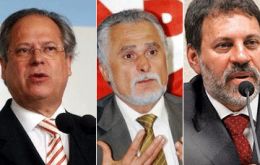
Brazil's Supreme Court convicted three top aides of former president Lula da Silva of graft related to a vote-buying scheme in Congress. Lula's ex-chief of staff Jose Dirceu was found guilty by six of the 10 judges in connection with the scheme that ran from 2002 to 2005 during the popular president's first term, a court spokesman said.
-
Wednesday, October 3rd 2012 - 03:59 UTC
Despite Dilma, Lula and Cardoso, Sao Paulo city could end with an outsider as mayor
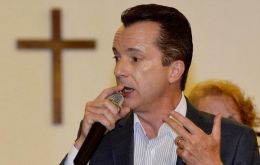
Brazilian president Dilma Rousseff joined her mentor Lula da Silva in a political rally in support of the Workers Party candidate for mayor of the city of Sao Paulo in next Sunday’s municipal elections when 140 million Brazilians are registered to vote.
-
Monday, October 1st 2012 - 20:25 UTC
Eight million Brazilian still live in “extreme poverty” conditions
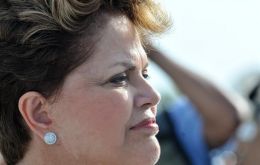
Eight million Brazilians still live in extreme poverty, with monthly family incomes of 35 US dollars according to official data released on Monday and which represents a 5% drop compared to the previous survey.
-
Saturday, September 29th 2012 - 08:38 UTC
PM Cameron admits disagreements with Brazil on some foreign policy issues

British Prime Minister David Cameron admitted that UK and Brazil did not agree in all foreign policy issues, but welcomed the existence of an open debate between the two countries. PM Cameron ended on Friday a two-day visit to Latinamerica’s largest economy to promote trade and investment.
-
Saturday, September 29th 2012 - 01:06 UTC
Rousseff tells Cameron British interest in Brazil has come at the right time
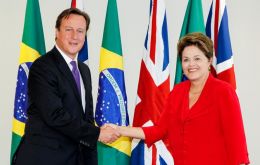
President Dilma Rousseff said British interest in Brazil had come at the right time after her government announced last month a 66 billion dollars investment in road and railway building as part of a massive plan to upgrade her country's dilapidated infrastructure, which includes modernizing ports and airports.
-
Wednesday, September 26th 2012 - 01:05 UTC
Brazil says orthodox fiscal policies worsened the recession in developed countries
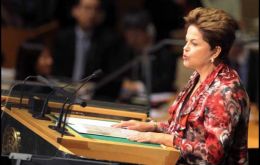
Brazilian President Dilma Rousseff who opened the UN round of General Assembly speeches, called on countries to boost international efforts to tackle the global economic crisis, stressing that a balance must be found to stimulate growth while at the same time controlling public spending without resorting to extreme austerity measures.
